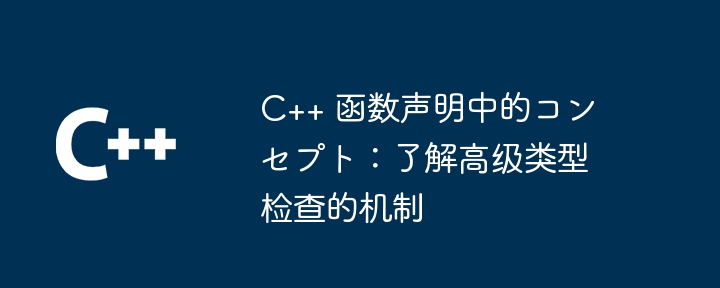Home >Backend Development >C++ >Code in C++ function declaration: Understand the mechanism of advanced type checking
Code in C++ function declaration: Understand the mechanism of advanced type checking
- WBOYWBOYWBOYWBOYWBOYWBOYWBOYWBOYWBOYWBOYWBOYWBOYWBOriginal
- 2024-04-30 18:51:02368browse
Concepts in C provide advanced type checking that allow restrictions on template parameter types to be imposed in function declarations. Constraints are defined using the concept keyword to specify conditions or other constraint combinations for template parameters, which are used to check whether the parameter type meets the requirements. Using constraints in function declarations forces the compiler to verify that parameter types satisfy the constraints at call time, improving code safety and maintainability.

Concept in C Function Declaration: Mechanism for Advanced Type Checking
In C, concept is a powerful mechanism that allows you to type in functions Restrictions on template parameter types are specified in the declaration. This is called a conceptual constraint, and it can significantly improve the safety, readability, and maintainability of your code.
Syntax for using constraints
Constraints are defined using the concept keyword, followed by the constraint name and a template parameter list. The constraint body specifies restrictions on template parameters, using a combination of conditions or other constraints. The following is an example of a constraint that checks whether a parameter is of type integer:
concept Integral = requires(T) {
std::is_integral<T>::value;
};Using constraints in function declarations
Constraints can be used as template parameters in function declarations. This forces the compiler to check that the parameter types comply with the constraints when the function is called. The following is a function declaration using Integral constraints:
template<Integral T>
void multiply(T a, T b) {
...
}Practical example
The following is a function example using Integral constraints:
int main() {
// 合法的函數調用,傳入整數類型参数
multiply<int>(5, 10);
// 非法函數調用,傳入浮點數类型参数
multiply<double>(3.14, 2.71); // 編譯時錯誤
return 0;
} In this case, the compiler detects that the second function call causes a type mismatch and generates an error at compile time.
Summary
Constraints in C provide a powerful and flexible way to provide advanced type checking. By using constraints in function declarations, you can ensure that the function only receives parameters of a specific type, which helps prevent runtime errors and improves the robustness and reliability of your code.
The above is the detailed content of Code in C++ function declaration: Understand the mechanism of advanced type checking. For more information, please follow other related articles on the PHP Chinese website!

